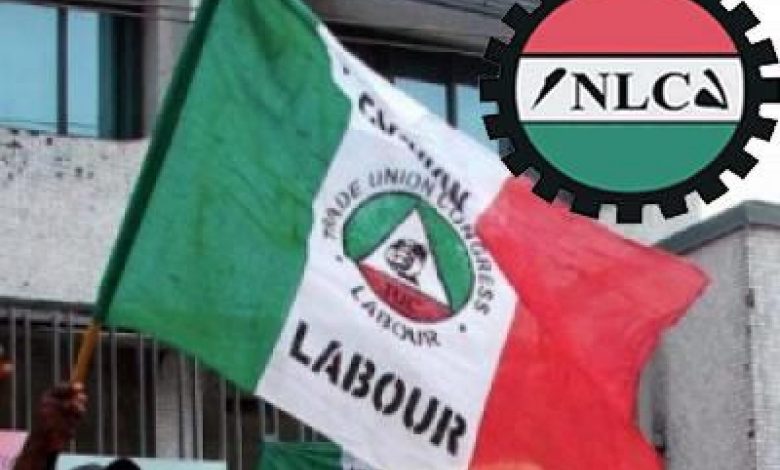NLC Laments Falling Prices

The NLC said its apprehension arose based on the likely consequences of the price decline which is bound to affect the budget benchmark and the country’s earning capacity.
In his response to an enquiry, NLC’s Chris Onyeka said the fears were made more apparent because of lack of fiscal discipline and judicious allocation of resources by the government.
According to another top official of NLC, who spoke on condition of anonymity, apart from affecting the ability of the government to discharge its debt repayment obligations, the ordinary Nigerians may be subjected to further deprivation since the government may use it as excuse to cut funding for safety nets and other things that impact on the welfare of the average Nigerian.
“For an economy that is largely dependent on a single product or what we call in economics – mono product economy like Nigeria, we find out that the health of that particular product determines the state of that country’s economy.
“In essence, the fiscal position of that country is dependent on what happens to the price of that product at the international market.
“Unfortunately for Nigeria, the drop in the price of crude below the budget benchmark will have a significant impact on the nation’s economy. It will make the country’s situation more complicated than it was before.
“This is a nation that has suffered severely as a result of its negative fiscal position, now that the price of oil has dropped to $60, which makes the situation even worse,” he explained.
He said a reduced revenue will make matters worse, adding that for a government that was already borrowing to service its debts, such would pose a big challenge.
“It means that the more you struggle to service your debt, the less you can meet your other fiscal challenges like having money to spend on things like infrastructure, health and education,” he said.
On the fears that organised labour may have on the price slump, the NLC said: “Once this happens, we will begin to have less money devoted to critical needs of the people like the social safety nets and welfare of workers.
“We are afraid that these things will not be provided for adequately, and then the ability to also deliver on the expectations of workers in terms of regular payment of salaries.”
The Labour official, however, said beyond the crude oil price drop was the issue of lack of fiscal discipline and profligacy on the part of government officials.
“Even with this level of fiscal challenge, the fact is that the problem the country has is waste in the economy. If there is fiscal discipline on the part of those running the economy, the government should be able to prioritise its spending and we will not have any issue.
“But where you have profligacy in the government and nothing is done to check it, then there is going to be little to spend on the people,” he said.
OPEC+ agreed on Saturday to accelerate oil production hikes for a second consecutive month, raising output in June by 411,000 barrels per day.
The June increase from the eight producers in the OPEC+ group would take the total combined hikes for April, May and June to 960,000 bpd, representing a 44 per cent unwinding of the 2.2 million bpd of various cuts agreed on since 2022.
To align with current realities, a number of internationally renowned finance institutions have reviewed their earlier projections for the oil market.
Goldman Sachs slashed its oil price forecast for a third time in one month after OPEC+ decided to hike production in June with a similar 410,000-bpd increase it is implementing in May.
Analysts at Goldman said they now see Brent crude prices averaging $60 per barrel this year, down from a previous forecast of $63 a barrel, while the average price of the US benchmark, WTI crude, has been downgraded to $56 for 2025, down from $59 a barrel previously.
According to Goldman, next year, Brent may likely average $56 a barrel, down from $58, and WTI is expected at $52, down from $55 per barrel in the mid-April forecast it released before now.
Besides, Barclays lowered its Brent oil price forecast by $4 per barrel to $66/bbl for 2025 and by $2 to $60/bbl for 2026, citing the decision by OPEC+ to accelerate oil production hikes.
Barclays now expects OPEC+ to phase out the additional voluntary adjustments by October 2025, but also expects slightly slower US oil output growth. Overall, this loosens their balance estimates by 290, 000 bpd for 2025 and 110 kbd for 2026, it said.
In the same vein, Morgan Stanley joined other major investment banks in slashing oil price forecasts amid expectations of a larger market surplus later this year as OPEC+ plans to raise output much more than previously expected.
Morgan Stanley cut its oil price forecasts for the remainder of the year, anticipating a bigger glut. The bank revised down its projection of Brent Crude prices to $62.50 per barrel in the third and fourth quarters of this year, down by $5 per barrel from the previous forecast.
The market glut could reach 1.1 million barrels per day (bpd) in the second half of the year, Morgan Stanley reckoned, an upward revision of 400,000 bpd from the previous surplus forecast.



